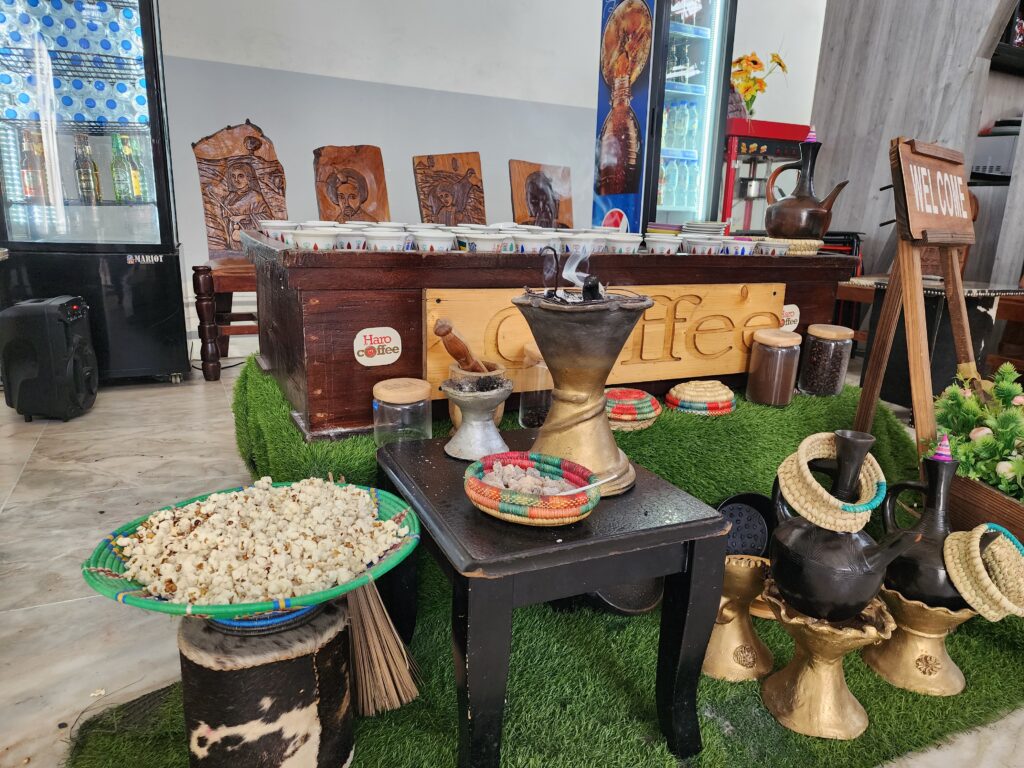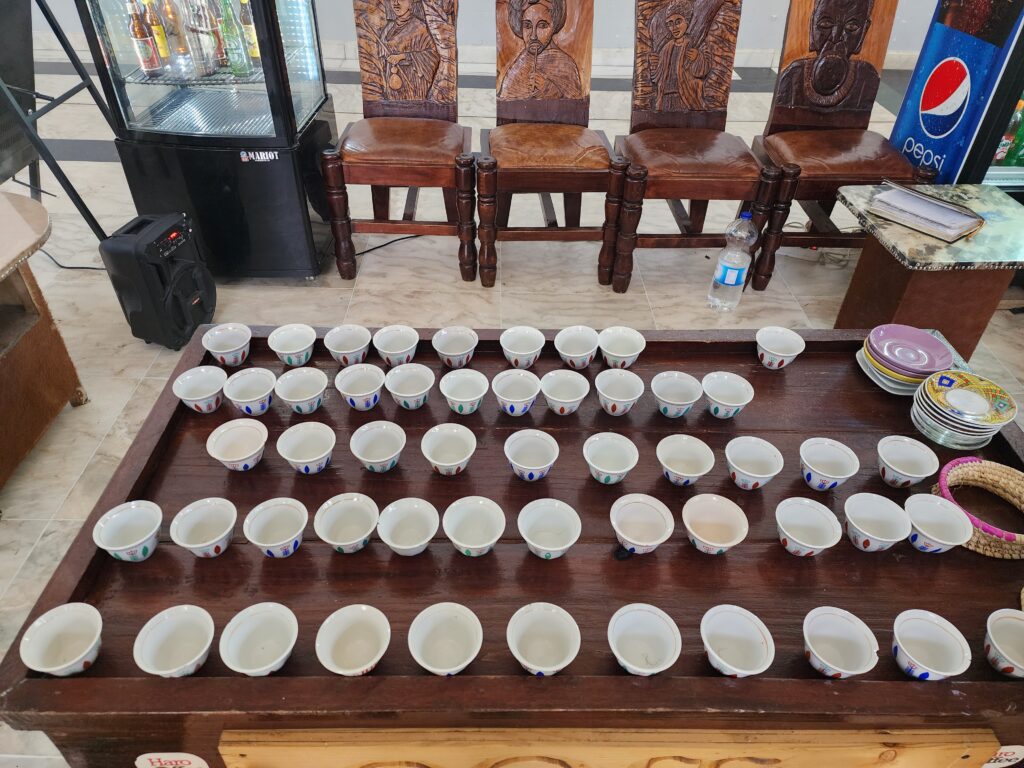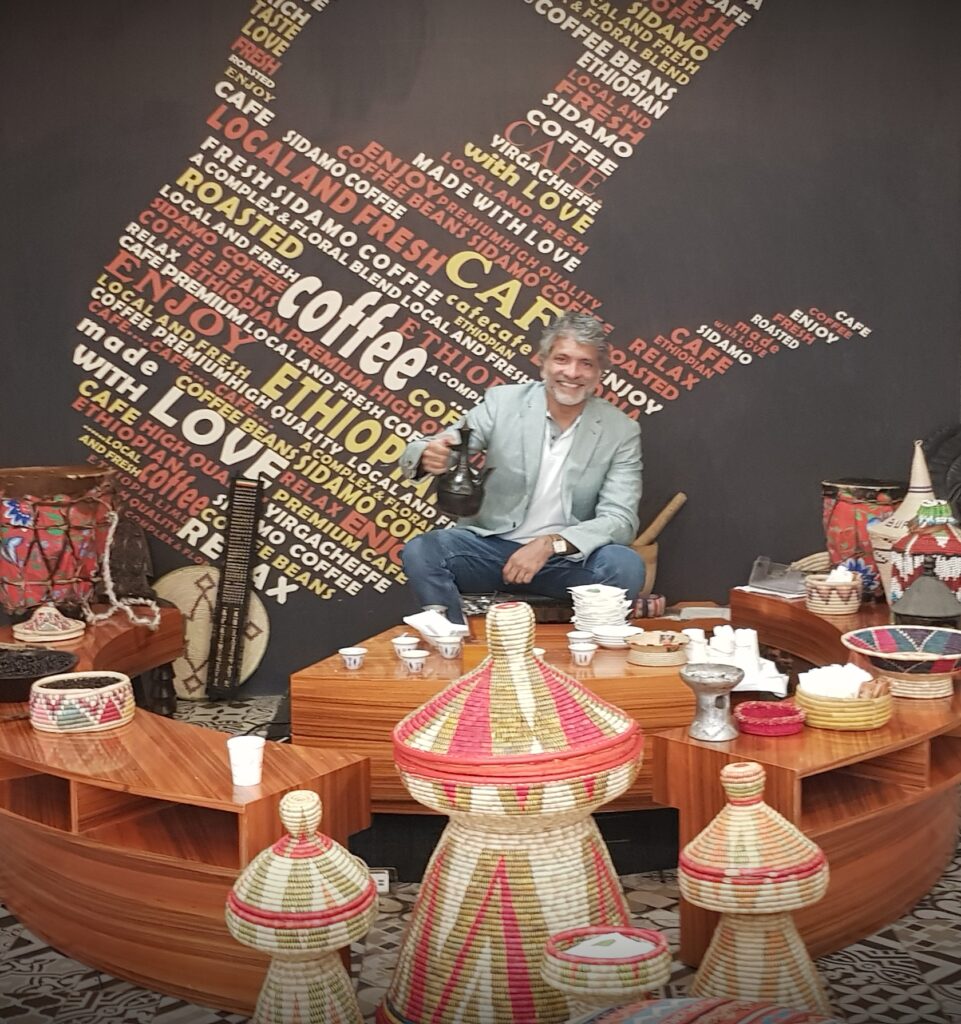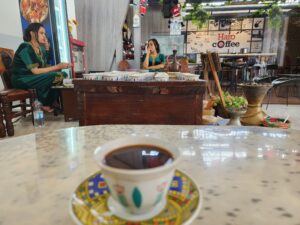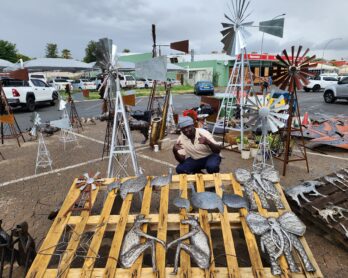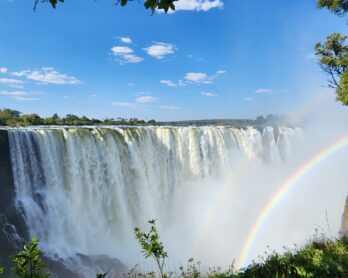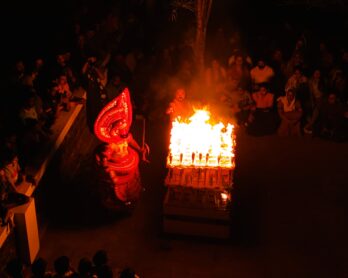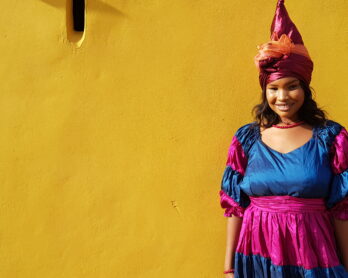“I am Nabira,” she said gesturing towards me to take a seat. Adjusting the flowy chiffon drape of her habesha kemis she sat down at the center of the ceremonial table. “I am your hostess for Bona Tetu, welcome.” Curt courtesies.
One usually has to be invited to this highly personal Ethiopian tradition meaning ‘drink coffee’ but as somebody passing through, I had to make do with the only available option – a T20 take on a lengthy ceremony rife with symbolism. Once the ritual comes to an end, nobody is a stranger – everyone a friend, and some for life even. Nabira had an intensity which made you need to know more about her – her name changed and not photographed at her request for what she told me.
“Where are you from?” I enquired a bit too eagerly perhaps wanting answers for the historic confusion – or similarity – between South Indians and Ethiopians.
“I am from Oromia,” she answered.
Nabira stirred some incense in a chamber pot which almost immediately spewed fragrant smoke. It was how the elaborations began – by warding away evil spirits. Probably more than spirits today. Her moves were studied but not slow. She warned me, warm eyes behind smoke screen, that she would be going through some of the customs a bit hurriedly due to lack of time. It was fine, I had a flight to catch as well. The ripe red coffee beans wouldn’t be washed and cleaned as was the custom, but the beans that was already de-husked and dried would be going into the long-handled roasting pan which was already hot over a low flame.
“Where is Oromia?” I asked.
She glanced at me briefly while throwing a few handfuls of beans into the heated vessel, shaking the whole thing by the handle for evenness. The seeds turned a shiny dark and began springing around making popping sounds. Fanning the roast sent out aromatic wafts. Coffee in the air. Kaldi, the goatherd from the Kaffa region in Ethiopia, whose charges had the first ever shot of coffee in history, would be beaming. It was a good smell to be hanging around.
“You don’t know Oromia?” She asked without looking at me.
Usually, I do a spot of reading up before visiting any place but this time I was summoned at short notice on work. I shook my head.
“The international media doesn’t report it as it’s just another day in Africa.”
What is just another day in Africa? It was no longer the dark continent but the rising one. I had been to Namibia, South Africa, and a few other countries before reaching Ethiopia. Everyone I met brimmed with vigor and energy, hope and heads held high, and leaderships invariably had a vision for the future.
Using a mortar and pestle Nabira ground the crispy beans which were then transferred into a flat-bottomed clay pitcher known as jebena. She then poured water into it and placed it over the fire.
“I came to Addis in 2019 when fights broke out between the Oromia and Amhara communities, hundreds have been killed and thousands displaced since then.”
I could have said I was sorry. But she didn’t look like she needed sympathy. Far from a jeremiad, she was matter of fact. A gritty survivor who needed more understanding than sympathy. For over three years Ethiopia has been in the grip of an ethnic violence involving the Oromo and Amhara rebels; drought this year has made the humanitarian crisis only worse. Violence has not only continued but is getting out of hand by the day. Media coverage has been in spurts from unidentified, unverified sources.
“Many from my family were killed, we lost our houses. I walked for several days fearing violent reprisals or death from the hands of a brutal militia. It is mostly civilians who get caught in the crossfire between the rebels and government soldiers.”
She dabbled in many jobs before joining a travel company and honing her own skills as a coffee ceremony hostess. This was not her first job either – there were some which she would rather not talk about. A lot of compromises and adjustments had to be made like the clothes she wore; the Oromo people preferred leather over the white cotton dress she wore. But she proudly told me that she had been learning English for four years now ‘from the internet’.
The boiling coffee was poured into a decanter and cooled, poured back again and boiled, thrice. Finally, it was poured through a filter into cups. Thick, aromatic, frothy brew. Nothing like it. Sugar was optional. I took a cup and sipped, lost.
The Oromo’s plight goes back to 1973 actually when they wanted to form an independent state of Oromia because of prejudice and abuse. It continues to this day albeit in spurts. Schools were the hotbeds of anti-government demonstrations.
“I got many cousins at the forefront of these protests,” she leaned a little forward and said in a conspiratorial tone.
Three rounds of coffee apparently named after the three goats that first ate the seeds which made them frisky – Abol, Tona and Baraka – is the norm. I was on my second one.
“Protests are planning to spread out from December regardless of how hard they come down on us.”
Baraka, the name of the third cup, means to ‘be blessed.’
“We will hoist our own flag, if not today then tomorrow.”
This story was originally published in Frontline magazine from The Hindu Group.


